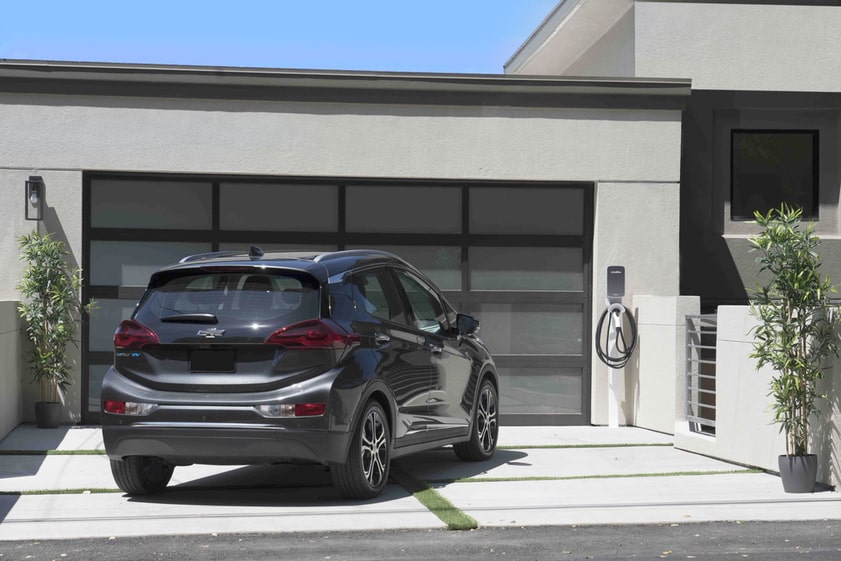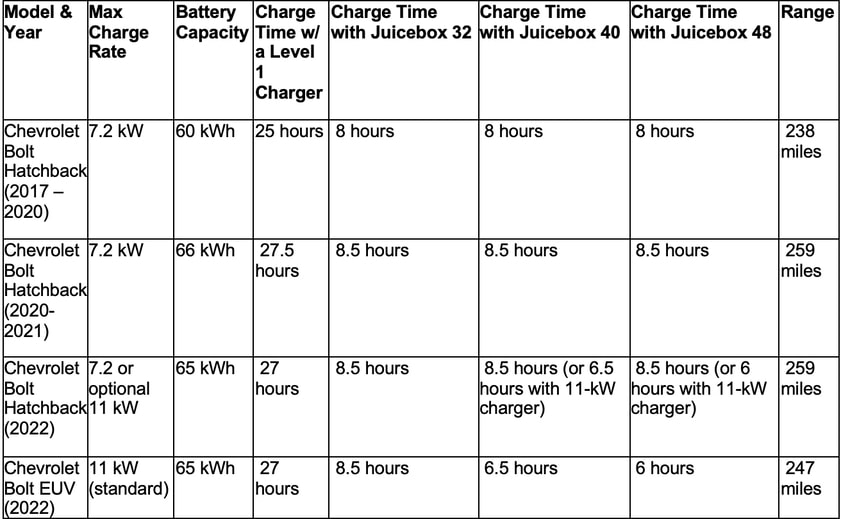How long does it take to charge a Chevy Bolt?

The all-electric Chevy Bolt is one of the most affordable and practical EVs available today. It combines an accessible starting price of $31,995 with a generous driving range of 259 miles. The key to the Bolt’s long range is its large battery pack, which holds between 60 and 66 kilowatt-hours (depending on the exact year and model). But how long does it take to charge a Chevy Bolt?
How to calculate Chevy Bolt’s charging time
Calculating the Bolt’s battery charging time is surprisingly easy. Estimating charging times is simply a matter of knowing the size of the battery pack and the charging rate.
• 2021 Bolt Battery Size: 65 kilowatt-hours (up from the first-generation Bolt’s 60 kWh
• Bolt Charging Rate: Commonly 7.2 kilowatts using a Level 2 charging station
So, how long does it take to charge a Chevy Bolt? In a nutshell, the charging time is calculated by dividing the number of kilowatt-hours (65) by the kilowatts (7.2). Here’s the answer:
• Charging a Bolt from empty to full takes about 8.5 to 9 hours.
Keep in mind that nearly all EV charging takes place at home, where using a JuiceBox Level 2 smart charger allows you to conveniently schedule when the electricity starts to flow—regardless of when you plug in the car. With a smart charging station, you can rest assured that the Bolt’s battery will be fully charged and ready to go every morning. And JuiceBox also allows EV drivers to take advantage of the best electricity rates and the cleanest energy available.
What type of charger does a Chevy Bolt use?
Here’s a bit more background on the calculation. If you plug in a Bolt for one hour using a 7.2-kW charger, you’ll add 7.2 kilowatt-hours of energy to the battery. In other words, 7.2 kilowatts of power for one hour equals 7.2 kilowatt-hours of energy added to the battery.
To understand how much range is provided by those 7.2 kilowatt-hours, use this rule-of-thumb:
• Every kilowatt-hour provides about 4 miles of driving range. (Of course, your mileage may vary.)
That means for the 7.2 kW Bolt, you can add up to about 28 miles of range per hour of charging via a Level 2 JuiceBox charging station.
Are there faster and slower home charging methods for the Chevy Bolt?
Chevrolet and other EV-makers are not standing still with their charging technologies. The Bolt EUV—a sport utility version of the Bolt —has increased the charging rate to 11 kilowatts, and this faster rate is also available as an option for the latest Bolt compact hatchback. Take note: A capable Level 2 charging station with adequate amperage, like the JuiceBox 48, is required to achieve that full 11-kW rate.
The jump from a 7.2-kW charger to an 11-kW charger, of course, adds more electricity per hour.
• At 11 kW, the Bolt fully charges in about 6 hours.
• The faster Level 2, 240-volt charger adds about 40 miles of range in an hour.
Regardless of which Bolt or other EV you drive today, the smart move is to buy a connected, smart charging station with the greatest power. Buying a JuiceBox 40 or 48 today will ensure that you can have the fastest charging speed for many years to come. In other words: future-proof!
The advantage of using a smart charging station goes beyond fast charging times. Enel X, the maker of JuiceBox charging stations, works with utilities to reduce peaks in energy demand across the grid. That helps utilities and local, regional entities utilize renewable energy (like wind and solar) when it’s most abundant. Enel X also offers JuiceEco Renewable Energy Certificates (RECs), so you can match the electricity used to charge a car with clean, renewable energy and reduce your carbon footprint.
Another option for home EV charging—although not a recommended one—is using a standard three-prong 120-volt outlet, which can require two or three days to fully charge a Bolt. That’s too slow. We also recommend avoiding using charging station that doesn’t connect to WiFi, since it will not allow you to manage your energy use or use the greenest and most affordable electricity.
Chevy Bolt Home Charging Time

Are road trips possible in the Chevy Bolt?
As noted above, it’s a cinch to add about 28 to 40 miles of driving range per hour of using a home charging station. But what happens when you need to charge away from home, for example, on a road trip? Fortunately, today’s electric vehicles, including the Chevrolet Bolt EV, have the capacity for DC fast charging. Public DC fast charging stations, situated on popular highway routes, provide a walloping 55 kilowatts of power. That’s more than seven times faster than using a 7.2-kW charger.
Many EV drivers only use public DC fast chargers for road trips. But how fast will a DC fast charger charge a Chevy Bolt?
• It takes about 1 hour to charge a Chevy Bolt from empty to 80 percent using a DC fast charger.
Chevy pegs the quick-charge time for adding 100 miles of range via DC charging at 30 minutes. Admittedly, it’s tricky to pinpoint the exact charging rate for DC fast charging because there are many nuances and caveats. For example, as the battery fills up, it becomes harder to jam in more energy. So the charging rate is faster in the first few minutes when the battery pack is nearly empty—and then it slows down when the battery becomes almost full.
Regardless, Chevrolet EV drivers have access to about the 80,000 DC fast chargers in North America. That enables a Bolt EV owner to complete long-distance trips with little or no compromise compared to a gas-powered car.
The practicality of EV charging at home
This overview describes the various charging rates for a Chevy Bolt on a technical basis—how long it takes for battery cells to fill up with energy. But there’s a different answer for how long it takes a Chevy Bolt owner to charge: only one minute. That’s how long it takes to pull into a driveway or garage, reach for the plug on a charging station, and plug it in.
The ability to charge at home means no more wasting time on out-of-the-way special trips to a gas station. Once you’ve plugged in, there’s nothing else to do. A few hours later—after you’ve slept or simply gone about your day—the car is fully charged.
Want to learn more? Check out how long Chevy Volt charging stations can charge your electric vehicle here.







